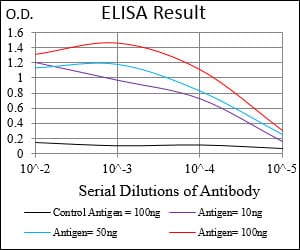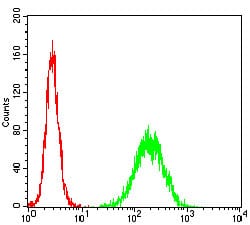

| WB | 咨询技术 | Human,Mouse,Rat |
| IF | 咨询技术 | Human,Mouse,Rat |
| IHC | 咨询技术 | Human,Mouse,Rat |
| ICC | 技术咨询 | Human,Mouse,Rat |
| FCM | 1/200 - 1/400 | Human,Mouse,Rat |
| Elisa | 1/10000 | Human,Mouse,Rat |
| Aliases | TCL1 |
| Entrez GeneID | 8115 |
| clone | 2E3A5 |
| WB Predicted band size | 13.5kDa |
| Host/Isotype | Mouse IgG1 |
| Antibody Type | Primary antibody |
| Storage | Store at 4°C short term. Aliquot and store at -20°C long term. Avoid freeze/thaw cycles. |
| Species Reactivity | Human |
| Immunogen | Purified recombinant fragment of human TCL1A (AA: 10-104) expressed in E. Coli. |
| Formulation | Purified antibody in PBS with 0.05% sodium azide. |
+ +
以下是关于TCL1A抗体的3篇参考文献,按研究内容和时间顺序整理:
---
1. **文献名称**:*TCL1 is activated by chromosomal translocation in T cell leukemia*
**作者**:Virgilio, L. et al.
**摘要**:该研究首次克隆了TCL1基因,发现其在T细胞白血病(如T-PLL)中因染色体易位(如14q32.1)异常激活,导致TCL1A蛋白过表达,促进淋巴细胞恶性转化。
---
2. **文献名称**:*TCL1A expression correlates with aggressive subtypes of T-cell leukemia*
**作者**:Narducci, M.G. et al.
**摘要**:通过免疫组化和抗体检测,发现TCL1A蛋白在侵袭性T细胞白血病(如T-ALL和T-PLL)中高表达,并与AKT信号通路激活相关,提示其作为预后不良的生物标志物。
---
3. **文献名称**:*TCL1A functions as an oncogene in B-cell malignancies by suppressing apoptosis*
**作者**:Suzuki, R. & Matsuoka, M.
**摘要**:研究证实TCL1A在部分B细胞恶性肿瘤(如B-CLL)中异常表达,通过抑制细胞凋亡和增强增殖驱动癌变,提示其可能成为治疗靶点。
---
4. **补充文献**:*TCL1A as a diagnostic marker in T-cell prolymphocytic leukemia*
**作者**:Herling, M. et al.
**摘要**:利用TCL1A抗体检测T-PLL患者样本,发现其高表达具有高度特异性,可作为区分T-PLL与其他T细胞肿瘤的关键诊断指标。
---
这些研究涵盖了TCL1A在白血病中的分子机制、诊断价值及治疗意义,如需具体期刊或年份可进一步补充。
The TCL1A (T-cell leukemia/lymphoma 1A) antibody is a tool used to detect the TCL1A protein, encoded by the TCL1A gene located on chromosome 14q32.1. Initially identified through its involvement in chromosomal translocations in T-cell prolymphocytic leukemia (T-PLL), TCL1A functions as an oncogene. The protein forms homodimers and interacts with kinases like AKT, enhancing their activity to promote cell survival, proliferation, and inhibition of apoptosis. Normally, TCL1A is expressed in embryonic tissues and restricted populations of immune cells, such as thymocytes and germinal center B-cells. However, its dysregulated overexpression in malignancies—triggered by chromosomal rearrangements, gene amplifications, or epigenetic changes—drives oncogenesis in T-cell leukemias, B-cell lymphomas (e.g., chronic lymphocytic leukemia), and other cancers.
The TCL1A antibody is widely used in research and diagnostics to study protein expression patterns via techniques like immunohistochemistry, Western blotting, and flow cytometry. Its detection aids in distinguishing T-PLL from other leukemias and provides insights into cancer progression mechanisms. Additionally, TCL1A's role in modulating AKT signaling has made it a biomarker for therapeutic targeting, with studies exploring its inhibition to counteract tumor growth. This antibody remains crucial for understanding TCL1A's pathological contributions and developing targeted cancer therapies.
×